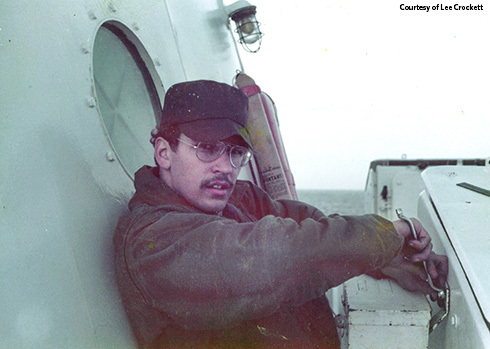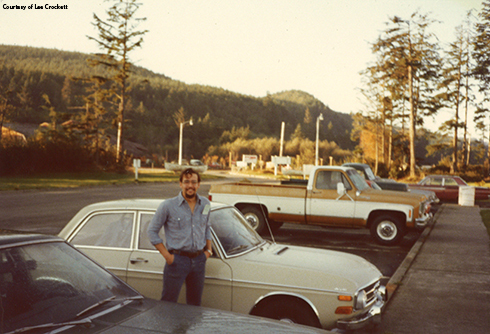This Thanksgiving I'm grateful for one simple act that set my life's course.
Shortly after high school graduation, I picked up an issue of National Geographic magazine with a story about the Coast Guard. I read about dramatic rescues at sea, about making the Mississippi River safe for ships and barges, and about ships that broke ice to clear a channel into a U.S. base in Antarctica.

Seaman Lee Crockett works on the ammunition lockers aboard the U.S. Coast Guard cutter Vigilant at
It all seemed so glamorous and exciting that the very next day I headed to the local recruiting office. My parents were away on vacation; by the time they returned from their trip, I was signed up for the Coast Guard. Imagine my mother's shock when she learned that I had made a major life decision based on reading a magazine article.
She calmed down--eventually--and I took to the sea, sometimes sailing for weeks at a time. On these journeys I fell in love with the ocean. I discovered its raw power, the depth of its beauty, and the mysteries of its creatures. And I learned that the sea would be a part of the rest of my life.
So in this Thanksgiving season, I'm giving a public thanks to the U.S. Coast Guard for the adventure that began my journey as an ocean steward--from research diver at the University of Connecticut, to congressional committee staffer, to National Oceanic and Atmospheric Administration fish biologist, to marine advocate and head of U.S. fish policy at The Pew Charitable Trusts.

Damage Controlman 3rd Class Lee Crockett at the Coast Guard Station in Neah Bay, Washington, in 1977.
I'm also grateful for the good things that have happened in U.S. ocean conservation in 2014.
* One of the fastest, largest, and most sought after fish in the sea caught a big break. NOAA approved new rules restricting use of long fishing lines baited with hundreds of hooks at the water's surface, a type of fishing gear that can harm bluefin tuna along the Atlantic Coast and in the Gulf of Mexico. The rules also include a new cap on the number of tuna that can be killed incidentally by the gear. Because the Gulf is the only known spawning grounds for the dwindling western Atlantic population of this species, this is a major victory for a fish that can swim as fast as racehorses run, grow to the size of a small car, make transoceanic migrations, dive deeper than 4,000 feet, and live up to 40 years.
Bluefin, however, aren't the only species that suffer from being caught unintentionally. Many fish and other marine animals are inadvertently hooked or netted, then thrown overboard dead or dying. The tally of this waste: almost a fifth of total fish caught nationwide, amounting to more than 1 billion pounds per year. We need to gather better data on the scope of the problem and find solutions, such as alternative fishing gear that doesn't snare non-target species.
* More fish populations have been rebuilt to healthy levels. The golden tilefish, Atlantic butterfish, and gag grouper have recovered from chronic overfishing, bringing to 37 the number of populations that have been restored since 2000. We still have a way to go, however. Of the 537 fish populations that federal regulators oversee, 38 are known to still need help to recover from overfishing. But I have high hopes that those fish also will get to healthy levels if we rebuild dwindling species as required under the Magnuson-Stevens Act--the primary law governing management of our nation's ocean fish.
* The public still has ample opportunity to have a say in how fish are managed. The White House finally rejected a rule, originally proposed in the previous administration, that would have limited public participation in decisions about how fishing rules and limits are set and would have changed how environmental studies about fish issues are managed. An alternate plan preserves the public's ability to engage in the decision-making process and, best of all, affirms the importance of ecological information, such as the cumulative impacts of multiple types of fishing, when federal regulators make decisions. In the coming year, we hope to see these procedures adopted.
* Congress didn't act on a proposal to weaken fish protection. The bill would have undermined federal requirements to quickly rebuild depleted fish populations. A better solution is to embrace 21st-century technology and ideas to more comprehensively manage our marine resources so that everyone can benefit from abundant fish, seafood, and recreational opportunities.
* Leaders are starting to think big about fish. We've spent many years setting fishing rules on a single species at a time - sometimes missing the big picture. But an idea known as "ecosystem-based fisheries management" gained some fresh momentum this year. Instead of focusing on one population at a time when setting fishing rules, this approach considers many factors in the marine environment including the impact of changes in the oceans and the habitat and food needs of fish. For the first time, ecosystem-based fisheries management was on the agenda at a national fish conference in Washington, DC. And a task force comprised of leading scientists from across the country is working to develop a practical blueprint that managers can use to write fishing rules by accounting for the relationships among marine life, humans, and the environment.
Here's hoping that 2015 makes us even better stewards of our valuable and intriguing oceans. Best wishes to you and your families this holiday season.
